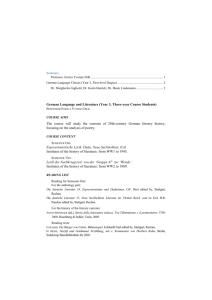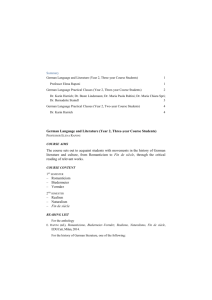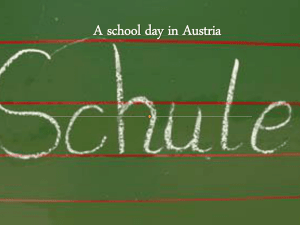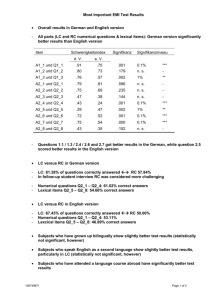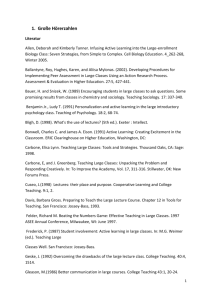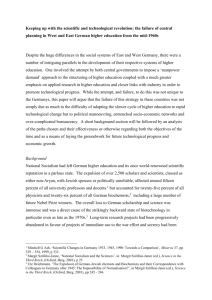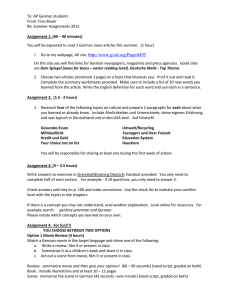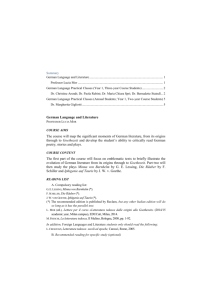German language 3 (Professional language and communication)
advertisement
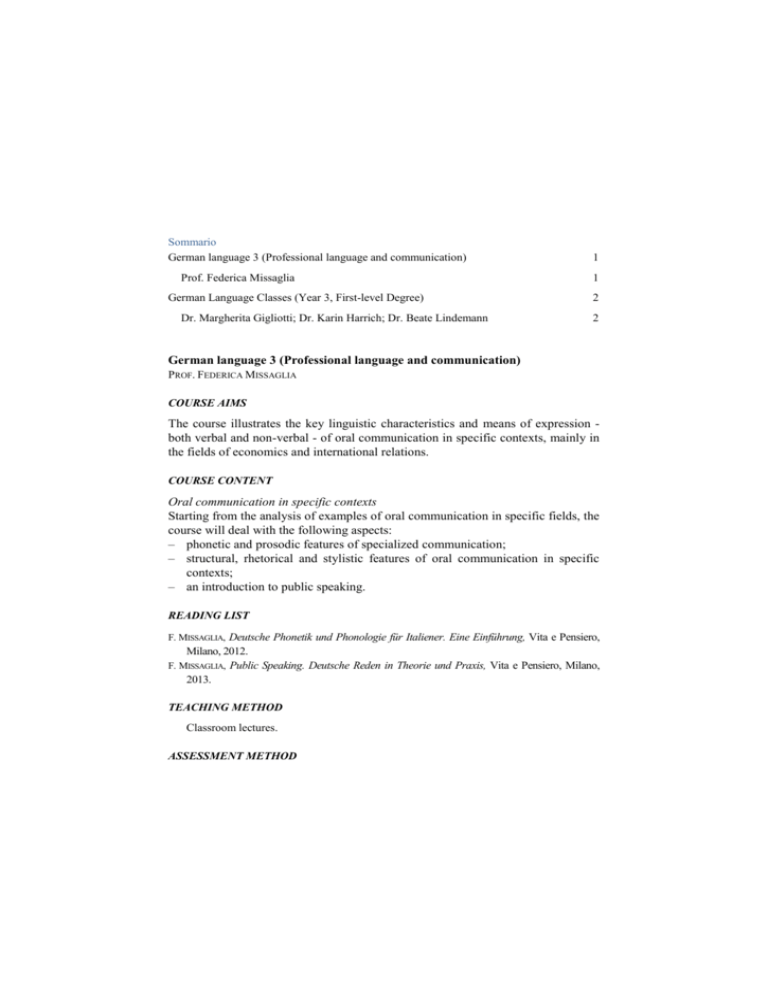
Sommario German language 3 (Professional language and communication) Prof. Federica Missaglia German Language Classes (Year 3, First-level Degree) Dr. Margherita Gigliotti; Dr. Karin Harrich; Dr. Beate Lindemann 1 1 2 2 German language 3 (Professional language and communication) PROF. FEDERICA MISSAGLIA COURSE AIMS The course illustrates the key linguistic characteristics and means of expression both verbal and non-verbal - of oral communication in specific contexts, mainly in the fields of economics and international relations. COURSE CONTENT Oral communication in specific contexts Starting from the analysis of examples of oral communication in specific fields, the course will deal with the following aspects: – phonetic and prosodic features of specialized communication; – structural, rhetorical and stylistic features of oral communication in specific contexts; – an introduction to public speaking. READING LIST F. MISSAGLIA, Deutsche Phonetik und Phonologie für Italiener. Eine Einführung, Vita e Pensiero, Milano, 2012. F. MISSAGLIA, Public Speaking. Deutsche Reden in Theorie und Praxis, Vita e Pensiero, Milano, 2013. TEACHING METHOD Classroom lectures. ASSESSMENT METHOD Oral exam in German to be taken on condition of having passed the language tests (oral and written). NOTES Further information can be found on the lecturer's webpage at http://docenti.unicatt.it/web/searchByName.do?language=ENG or on the Faculty notice board. German Language Classes (Year 3, First-level Degree) DR. MARGHERITA GIGLIOTTI; DR. KARIN HARRICH; DR. BEATE LINDEMANN COURSE AIMS The course plans to further develop the student’s German language skills to the C1 Level for receptive abilities and the B2 Level for productive abilities, as defined by the Common European Framework of Reference for Languages. COURSE CONTENT The course is organised as follows: 1. Oral communication – Study and correction of pronunciation and intonation; German phonetics and prosody. – Listening exercises using authentic texts: oral summaries and reflections on the different types of texts; identification of primary and secondary information. – Study of formal communication in professional, social and institutional contexts. 2. Written communication – Advanced reading of texts of various types based on different methods (global and local comprehension, skimming and selective reading). – Production of different kinds of written texts related to professional, social and institutional contexts. – Written summaries of oral texts and reflections on diverse text types. – Development of active and receptive Fachtexte skills with a focus also on the role of translation. 3. Exercises that combine oral comprehension and written production (“dictacomp”) Students are advised to advance their oral comprehension abilities by using the material found on the internet (e.g., the listening passages at www.dwelle.de, www.diezeit.de) and at the CAP self-learning centre. The CAP advisors are at the student’s disposal to advise and guide their activities to consolidate/improve their language skills levels. READING LIST Em neu 2008 Abschlusskurs, Kursbuch + Arbeitsbuch + CD, Hueber, Ismaning/München (ISBN 978-3-19-541697-9). TSCHIRNER, Grund- und Aufbauwortschatz Deutsch als Fremdsprache nach Themen, Cornelsen Verlag, Berlin, 2008 (ISBN 978-3-589-501697-1). To prepare for the exam, the student needs to read one book and a collection of articles which they will then present following the indications given in class. Choose one book to read from the list below: L. DONNA, Endstation Venedig, Diogenes, 2002 (zusätzlich auch als Audiobook erhältlich: Steinbach Sprechende Bücher 2003). H. BÖLL, Und sagte kein einziges Wort, Dtv, 1998 (zusätzlich auch als Audiobook erhältlich: Hörbuch Hamburg 2007). T. BERNHARD, Ein Kind, Dtv, 2005. U. TIMM, Die Entdeckung der Currywurst, Dtv, 2000 (zusätzlich auch als Audiobook erhältlich: Litraton 2004). T. BRUSSIG, Am kürzeren Ende der Sonnenallee, Fischer, 2001. Recommended for further study: The following German, Austrian and Swiss newspapers and magazines: Frankfurter Allgemeine Zeitung, www.faz.de. Die Welt, www.welt.de. Süddeutsche Zeitung, www.sueddeutsche.de. Handelsblatt, www.handelsblatt.com. Die Presse, www.diepresse.at. Der Standard, www.derstandard.at. Die Zeit, www.diezeit.de. Neue Zürcher Zeitung, www.nzz.ch. Dolomiten, www.dolomiten.it. Format, www.format.at. Der Spiegel, www.derspiegel.de. Focus, www.focus.de. Stern, www.stern.de. Any magazine of particular interest to the student to support their learning of morphosyntax and vocabulary. Recommended readings K. HARRICH-M.C. SPOTTI, Wege zum Hören, EDUCatt, Milano, 2014, in corso di pubblicazione. K. HARRICH-M.C. SPOTTI, Wege zum Lesen, EDUCatt, Milano, 2014, in corso di pubblicazione. All students are requested to: a. provide with a reference grammar DREYER-SCHMITT, Lehr- und Übungsbuch der deutschen Grammatik aktuell, Hueber, München (with the text of Lösungsschlüssel). Em Übungsgrammatik, Audio-CD, Hueber, Ismaning/München (ISBN 978-3-19-001657-0). b. provide with a a bilingual and a monolingual, synonyms and antonyms, stylistic dictionary (hold true the whole course): L. GIACOMA-S. KOLB (a cura di), Il dizionario di Tedesco, Zanichelli/Klett, Bologna. Dit, Dizionario Tedesco-Italiano/Italiano-Tedesco, Paravia, Torino. Duden, Deutsches Universalwörterbuch A-Z, 6. Auflage, Dudenverlag, Mannheim. Wahrig, Deutsches Wörterbuch, 8. neu bearbeitete Auflage, Bertelsmann, Gütersloh. Duden, Das Stilwörterbuch (Der Duden in zwölf Bänden), Bd. 2. Dudenverlag, Mannheim. Duden, Sinn- und sachverwandte Wörter/ Synonymwörterbuch der deutschen Sprache (Der Duden in zwölf Bänden), Bd. 8. Dudenverlag, Mannheim. c. Go to “Centro per l’Autoapprendimento” (III floor via Morozzo della Rocca) where students can use further reading for personal study and agree with the tutor about a research programme based on their knowledge (www.unicatt.it/selda-cap). ASSESSMENT METHOD The written exam consists of a) vocabulary and grammar test; b) oral comprehension test with open questions; c) written comprehension test; d) translation from specialised German; and e) translation into specialised German. The student is allowed to use both monolingual and bilingual dictionaries for the translation part. The oral exam will consist of an interview on six recent newspaper and magazine articles prepared by the students in line with the indications given during the course and on one of the books chosen from the course reading list. NOTES The translation classes will be split into groups of students with the same curriculum. Students are strongly advised to attend classes regularly. A small number of written exam simulations will be proposed during the year. Additional information on the course syllabus and exam will be given in class and support materials handed out. The students can find further materials for exercises in the language lab. Further information can be found on the lecturer's webpage at http://docenti.unicatt.it/web/searchByName.do?language=ENG, or on the Faculty notice board.
